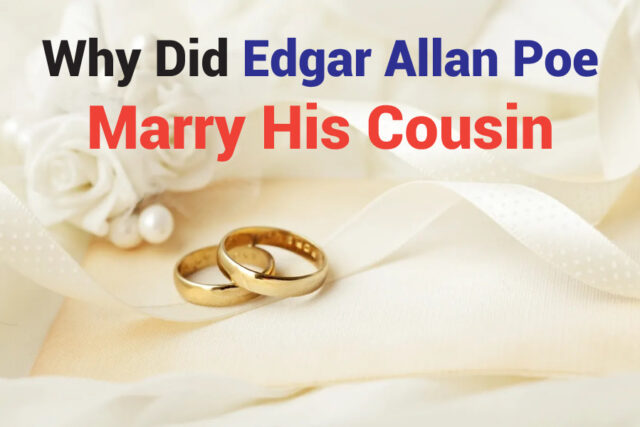Edgar Allan Poe, the renowned American writer, poet, and literary critic, has captivated generations with his dark and haunting works. His tales of the macabre and the supernatural have etched an indelible mark on the literary landscape. However, beyond his literary genius, Poe’s personal life was shrouded in mystery and controversy, particularly his marriage to his cousin, Virginia Eliza Clemm.
As we delve into the enigmatic world of Edgar Allan Poe, we find ourselves confronted with a tangled web of familial ties, societal norms, and personal motivations. This article aims to unravel the complexities surrounding Poe’s marriage to his cousin, shedding light on the historical context, the potential reasons behind this union, and the societal views that prevailed during that era.
Historical Context Of Cousin Marriage
To understand the significance of Poe’s marriage to his cousin, we must first explore the historical context in which it occurred. Cousin marriages, while not uncommon in the 19th century, were often met with varying degrees of societal acceptance and stigma.
During this period, cousin marriages were prevalent among certain social classes and geographic regions, particularly in rural areas where families lived in close proximity and intermarried to preserve wealth and land. However, in urban centers and among the intellectual elite, such unions were often viewed with skepticism and even disdain.
The Controversial Marriage Of Edgar Allan Poe And His Cousin
In 1835, Edgar Allan Poe, then aged 27, married his cousin, Virginia Eliza Clemm, who was just 13 years old at the time. This union not only raised eyebrows due to the significant age gap but also because of their familial relationship.
Virginia was the daughter of Poe’s paternal aunt, Maria Clemm, who had taken Poe into her home after the death of his parents. The marriage between Poe and Virginia was a decision that defied societal norms and conventions, sparking widespread criticism and speculation.
The Possible Reasons Behind The Marriage
While the exact motivations behind Poe’s decision to marry his cousin remain shrouded in mystery, several plausible reasons have been proposed:
Financial Security: Poe, who struggled with financial instability throughout his life, may have sought a practical arrangement that would provide him with a stable household and a sense of familial support.
Emotional Attachment: Poe’s tumultuous upbringing and the loss of his parents at a young age may have fostered a deep emotional bond with Virginia, whom he had known since childhood. This attachment could have evolved into romantic feelings, blurring the lines between familial and romantic love.
Societal Pressures: Despite the stigma surrounding cousin marriages, there were still pockets of society where such unions were accepted or even encouraged. Poe may have been influenced by the prevailing attitudes within his social circle or geographic location.
Personal Beliefs: Poe’s literary works often explored themes of the unconventional and the taboo. It is possible that his decision to marry his cousin was an extension of his unconventional worldview and a rejection of societal norms.
Society’s Views On Cousin Marriage During That Time
While cousin marriages were not illegal in the United States during Poe’s lifetime, they were met with varying degrees of societal acceptance and condemnation. The views on cousin marriage were shaped by a complex interplay of religious beliefs, cultural norms, and scientific understanding.
In some regions and social circles, cousin marriages were seen as a means of preserving family wealth and maintaining cultural traditions. However, in other circles, particularly among the intellectual elite and urban populations, such unions were viewed as morally reprehensible and potentially detrimental to the gene pool.
As scientific knowledge advanced, concerns about the potential risks of genetic disorders arising from consanguineous relationships (relationships between blood relatives) grew. This further fueled the stigma surrounding cousin marriages, leading to increased societal scrutiny and criticism.
Analysis Of Poe’s Writings And Their Influence On His Personal Life
To truly understand the enigma that was Poe’s marriage, we must delve into the depths of his literary works and the profound impact they had on his personal life. Poe’s writings were often imbued with themes of death, loss, and the macabre, reflecting the tumultuous nature of his existence. His stories, such as “The Fall of the House of Usher” and “The Masque of the Red Death,” explored the dark recesses of the human psyche, delving into the realms of fear, obsession, and the fragility of life.
It is through his literary works that we catch glimpses of Poe’s inner turmoil and the emotional turmoil that plagued him throughout his life. The loss of his mother at a young age, coupled with the subsequent abandonment by his father, left an indelible mark on Poe’s psyche, shaping his perception of love, loss, and the fleeting nature of existence.
As we analyze Poe’s writings, we can discern the profound influence his personal experiences had on his literary endeavors. The recurring themes of death, decay, and the macabre were not mere artistic expressions but rather a reflection of the emotional turmoil that consumed him. It is within this context that we can begin to unravel the enigma of his marriage to his cousin, Virginia Eliza Clemm.
The Impact Of The Marriage On Poe’s Career And Reputation
Poe’s marriage to his cousin, Virginia Eliza Clemm, was a union that defied societal norms and raised eyebrows among his contemporaries. At the time of their marriage, Virginia was just thirteen years old, while Poe was twenty-seven, adding an extra layer of controversy to their union. This unconventional relationship was met with scrutiny and criticism, casting a shadow over Poe’s reputation and career.
Despite the societal backlash, Poe remained steadfast in his commitment to Virginia, and their marriage endured until her untimely death from tuberculosis in 1847. During their time together, Virginia served as Poe’s muse, inspiring some of his most poignant and haunting works, such as the poem “Annabel Lee.”
However, the impact of this controversial marriage extended beyond the literary realm, affecting Poe’s career and reputation in profound ways. As a result of the societal stigma surrounding their union, Poe found it increasingly difficult to secure stable employment and financial security, further exacerbating the challenges he faced throughout his life.
The Societal Backlash:
- Poe’s marriage to his cousin was met with widespread condemnation and criticism from his contemporaries.
- The unconventional nature of their union was seen as a violation of societal norms and moral codes.
- This backlash cast a shadow over Poe’s reputation, making it difficult for him to gain acceptance in literary circles.
Financial Struggles:
- The stigma surrounding his marriage made it challenging for Poe to secure stable employment and financial security.
- Publishers and literary patrons were often reluctant to associate themselves with Poe due to the controversy surrounding his personal life.
- This financial instability added to the emotional and psychological strain Poe experienced throughout his life.
Artistic Isolation:
- The societal backlash and criticism of his marriage contributed to Poe’s sense of isolation and alienation from the literary establishment.
- He found himself on the fringes of the literary world, struggling to gain acceptance and recognition for his works.
- This isolation further fueled Poe’s dark and brooding literary themes as he channeled his personal experiences into his writing.
Despite the challenges and adversities he faced, Poe’s literary genius shone through, cementing his legacy as one of the most influential and celebrated authors in American literature. His marriage to Virginia Eliza Clemm, while unconventional and controversial, served as a catalyst for some of his most poignant and haunting works, forever intertwining his personal life with his literary prowess.
The Lasting Legacy Of Edgar Allan Poe And The Ongoing Fascination With His Personal Life
Edgar Allan Poe’s enduring legacy extends far beyond the realms of literature, transcending time and captivating generations of readers and scholars alike. His works have become ingrained in the fabric of popular culture, inspiring countless adaptations, homages, and tributes across various artistic mediums.
One of the most intriguing aspects of Poe’s legacy is the ongoing fascination with his personal life, particularly his unconventional marriage to his cousin, Virginia Eliza Clemm. This fascination has fueled countless debates, analyses, and speculations as scholars and enthusiasts alike attempt to unravel the mysteries surrounding this enigmatic union.
1. Literary Influence
- Poe’s works have had a profound impact on the literary landscape, influencing countless authors and shaping the genres of horror, mystery, and detective fiction.
- His innovative writing techniques, such as the unreliable narrator and the use of psychological suspense, have become staples in modern literature.
- Poe’s influence can be seen in the works of authors ranging from Sir Arthur Conan Doyle to Stephen King, cementing his legacy as a literary titan.
2. Cultural Impact
- Poe’s stories and poems have transcended the written word, inspiring numerous adaptations in film, television, and other artistic mediums.
- His works have become ingrained in popular culture, with iconic characters and phrases becoming part of the cultural lexicon.
- Poe’s influence can be seen in everything from gothic fashion to heavy metal music, reflecting the enduring appeal of his dark and brooding aesthetic.
3. Scholarly Fascination
- Poe’s personal life, particularly his marriage to his cousin, has been the subject of intense scholarly scrutiny and debate.
- Researchers and biographers have delved into the complexities of this unconventional union, seeking to understand the motivations and circumstances surrounding it.
- This ongoing fascination has fueled a wealth of academic discourse, ensuring that Poe’s legacy remains a subject of enduring interest and analysis.
As we continue to explore the depths of Poe’s literary works and personal life, we are reminded of the enduring power of his storytelling and the lasting impact of his unconventional choices. His marriage to Virginia Eliza Clemm serves as a testament to the complexities of human nature and the inextricable link between an artist’s personal experiences and their creative endeavors.
Conclusion
The marriage between Edgar Allan Poe and his cousin, Virginia Eliza Clemm, remains an enigmatic and controversial chapter in the life of one of America’s most celebrated writers. While the exact reasons behind this union may never be fully understood, it serves as a reminder of the complex interplay between personal choices, societal norms, and the ever-evolving understanding of human relationships.
Through this exploration, we gain insight into the multifaceted nature of human experiences, challenging our preconceptions and inviting us to approach the past with empathy and an open mind. Poe’s decision to marry his cousin may have been unconventional, but it also reflects the depth of human emotions and the intricacies of familial bonds.
As we reflect on this chapter in literary history, we are reminded that love, in all its forms, can transcend societal boundaries and defy conventional expectations. While the union between Poe and Virginia may have been met with criticism and skepticism, it also stands as a testament to the enduring power of human connection and the complexities that shape our personal narratives.














